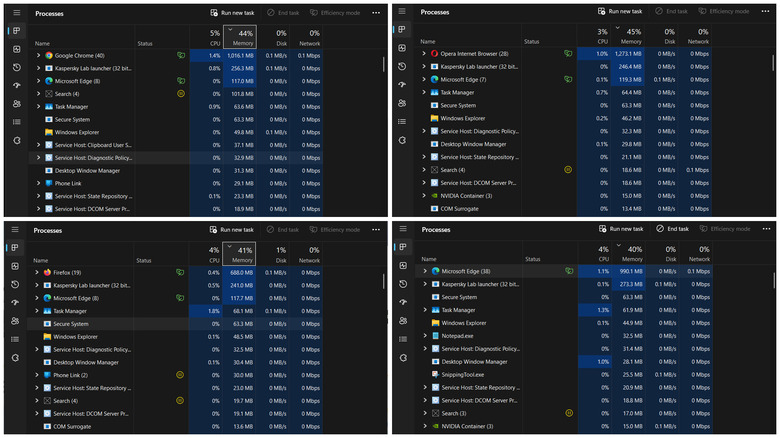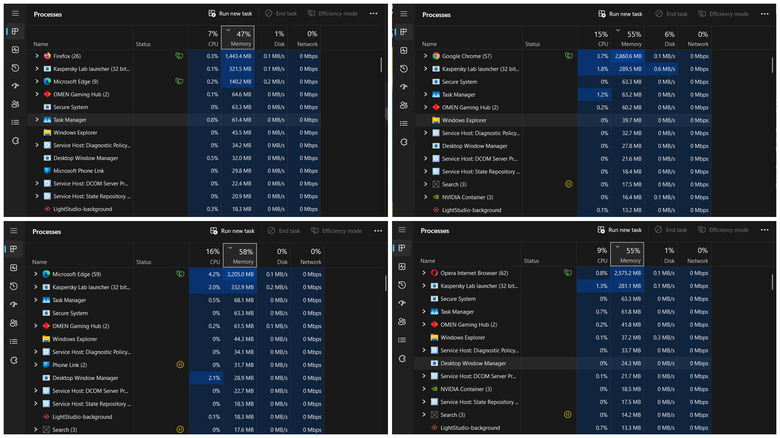We Tested 4 Browsers, And This One Used The Least Amount Of RAM
Browsers can be the biggest memory hogs for your computer, especially if you open multiple resource-hungry websites. While the browser's memory consumption is almost always proportional to the number of active tabs, memory management techniques such as process isolation, tab suspension, and dynamic allocation keep the memory usage in check. Most modern browsers employ these techniques in varying proportions, but it all boils down to optimizing the backend for best memory management.
Until recently, Chrome was infamous for its unrestrained RAM usage, and it was one of the reasons that led to its decline in overall market share. On the other hand, Microsoft Edge has steadily gained traction, partly due to its reputation of going easier on the system memory. Interestingly, both Edge and Chrome are Chromium-based browsers -– they use Google's open-source browser tech under the hood. Is the hearsay about their RAM usage true, or does Chromium even everything out? To find out, we tested some popular browsers for their RAM usage, including Chrome, Edge, Firefox, and Opera.
Testing parameters
To ensure a level playing field, we tested each browser with the same set of tabs and closed all the background apps. The tabs included three random blogs and the ChatGPT homepage. In the next stage of our testing, we wanted to test the browsers for their tab suspension. For this, we opened 20 tabs to check how effectively these browsers suspend background tabs to ensure optimal RAM usage.
While the first stage of this test gives a peek into a browser's live tab optimization, the second stage focuses on a browser's ability to handle a frenzy of multiple open tabs. We tested each browser in incognito mode to avoid cookies and extensions from affecting the test results. Moreover, all tests were performed on the same HP Victus Laptop sporting Windows 11 (version 24H2). Finally, we analyzed the effects on system memory using Window's very own Task Manager. Here's what we found out!
Comparing memory usage with fewer tabs
In the first stage of the testing, we opened the same four tabs and measured their RAM usage with the Task Manager. The results were as follows:
- Opera- 1260-1280 MB
- Google Chrome – 1010-1030 MB
- Microsoft Edge – 980-1000 MB
- Firefox – 680-700 MB
In our testing, we found Edge to have a slight edge over Google Chrome in memory usage. However, the difference wasn't substantial, partly because of the similar Chromium-based build. Opera was the biggest memory hog by a long shot, mostly due to the feature-rich user interface, as Opera sports a built-in ad blocker, VPN, and a screenshot tool even in its version of incognito mode.
Interestingly, Firefox used the least amount of memory in our testing, and the difference is night and day. The Quantum browser engine powering Mozilla's Firefox browser significantly reduces RAM usage, delivering a much smoother browsing experience. Fun fact, Firefox too has a built-in ad blocker in its incognito mode equivalent, but still manages to maintain its lightness.
Comparing memory usage with more tabs
In the second phase of our testing, we opened 20 tabs including 18 random blogs, a ChatGPT homepage, and a Google search result. This test provides an insight into a browser's tab management capabilities, especially under heavy workloads. The results were:
- Microsoft Edge- 3200-3250 MB
- Google Chrome- 2850-2900 MB
- Opera – 2550-2600 MB
- Firefox – 1450-1500 MB
In our test, Microsoft Edge required the most memory to simultaneously open 20 tabs. Chrome was next with a slightly lesser RAM consumption, ranging close to 2850 MB. Surprisingly, Opera scored a respectable 2550-2600 MB RAM consumption, despite its poor RAM management in the first test. Firefox built on its lead from the first test and obliterated the competition by a substantial margin.
If you run your PC on a lower system memory, Firefox can make a huge impact by making room for more tabs without choking up your computer. Apart from Firefox, all Chromium browsers from our test had somewhat comparable RAM consumption, with Edge being better with fewer tabs and Opera being better with more tabs. Chrome lives up to its reputation as a memory hog, ranking next to last in both the tests.



